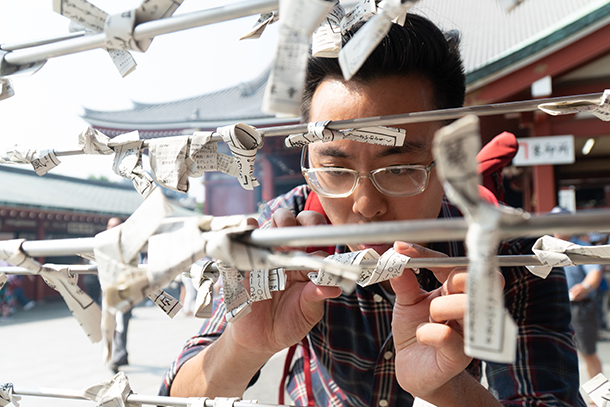“We all want to aspire to say that we are global citizens, but it’s not until you step into a different country and different land and live with people and talk with people who can teach you about new experiences in life,” said Elahe Nezami, PhD, program director of the Keck School of Medicine of USC’s Master of Science in Global Medicine program, addressing a packed house assembled in Aresty Auditorium for the Summer 2018 Global Citizenship Roundtable.
The Roundtable, now in its sixth year, is an opportunity for students in the Master of Science in Global Medicine program who have participated in the program’s study abroad courses, and recipients of the Dhablania and Kim Family Global Medicine Fellowship, to present their overseas research and experiences to their fellow students and faculty members.
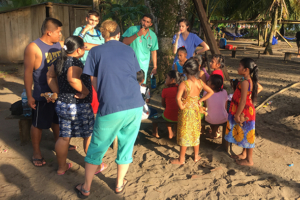
Global Medicine students studying in Panama work with local children. (Photo/Courtesy Global Medicine Program)
This Roundtable showcased student travel to Japan, Malaysia, Panama, Fiji, Indonesia, Armenia, Rwanda, Israel and the Philippines. Locales ranged from modern megacities like Tokyo to remote jungle locations in the Bocas Del Toro archipelago of Panama and included closer-to-home destinations like post-Hurricane Maria Puerto Rico.
While the destinations and research varied, one of the themes that ran through the day’s presentations was the concept of community when seeking to improve global health outcomes, whether that was as part of an established social network of shared values, or the need to establish relationships and trust with patients.
“It takes a village … literally. I couldn’t have done this project without having my connections and friends and colleagues in Fiji,” said Liz Dunn, a Dhablania and Kim Family Global Medicine Fellow.
“For example, the ministry of health driver who offered to work on the weekends to drive our IT specialist to and from the facility — none of this would have been done if not for these people,” continued Dunn, who managed a project in conjunction with the government, which oversaw the implementation of electronic medical record keeping systems in Fiji.
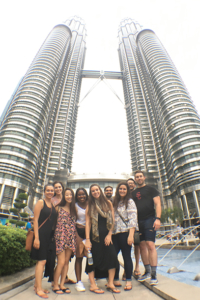
Global Medicine students who studied abroad in Malaysia shared their experiences at the Global Citizenship Roundtable. (Photo/Courtesy Global Medicine Program)
Soma Sahai-Srivastava, MD, clinical professor of neurology (clinician educator), emphasized this point in her keynote speech about neurological care in Cambodia, a country which, despite high rates of neurological disorders, has had no functional system for providing neurological care.
Sahai-Srivastava noted the importance of making those initial connections, whether through individuals she met or through a growing network that has now expanded to include faculty and student volunteers working together with Cambodian students, residents, faculty and administrators to expand opportunities for neurological care.
“It always starts with a personal connection. I am Indian, but I spent a lot of time in Cambodia, and that is why I work there now, the connections I made,” Sahai-Srivastava said. “Every time I go, I grow, and I feel I need to thank the Cambodians for letting me work with them.”
Student groups presented, with great enthusiasm, about the connections they made, whether in jungle settings in Panama where students organized community health education, or in Tokyo, where students had the opportunity to compare and contrast health care systems with fellow students from universities across Asia, and in Malaysia where they observed urban and rural scenarios for public health care schemes that encompassed Malaysia’s unique mix of Malay, Indian and Chinese cultures.
“We have special gratitude for the people who teach us when we are abroad — from deans and presidents of schools to a 6-year-old in Panama who teaches you what it means to be happy,” Nezami said. “You will never be a successful health care professional if you don’t know how to play in a team and know the role of other people.”
The Master of Science in Global Medicine program holds study abroad courses three times per year. The next Global Citizenship Roundtable will take place in Spring 2019.
For more information, visit msgm.usc.edu.
— Ryan Seuffert
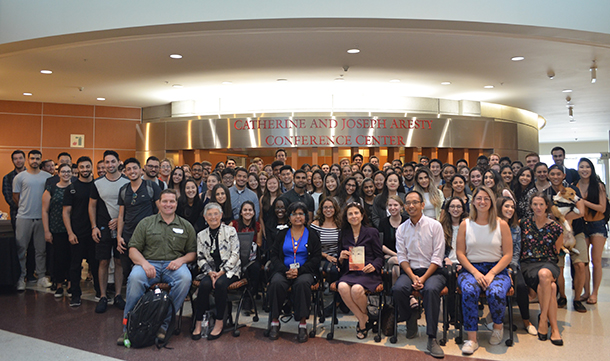
Global Medicine students who studied abroad participated in a Global Citizenship Roundtable to discuss their experiences throughout the world. (Photo/Courtesy Global Medicine Program)
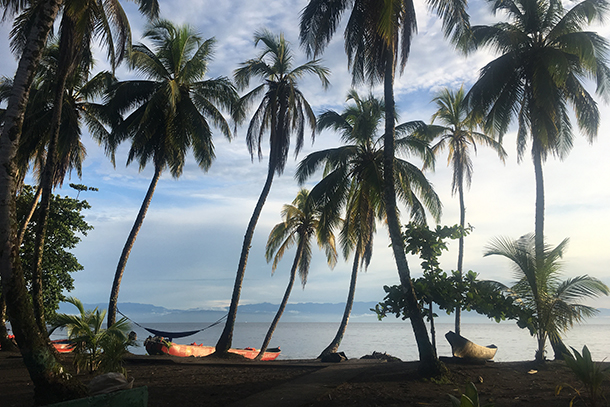
Panama is one of the locations where students are able to study abroad. (Photo/Courtesy Global Medicine Program)


